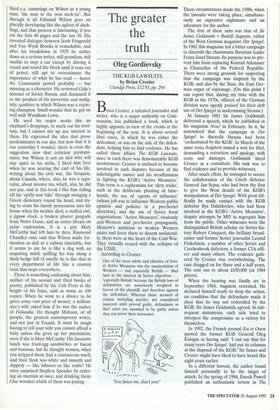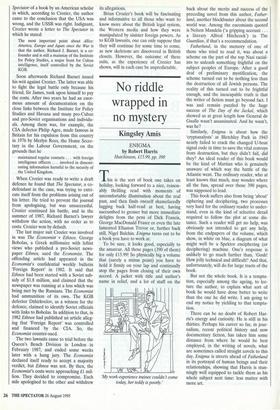The greater the truth
Oleg Gordievsky
THE KGB LAWSUITS by Brian Crozier Claridge Press, £12.95, pp. 294 Brian Crozier, a talented journalist and writer, who is a major authority on Com- munism, has published a book, which is highly apposite in view of the events at the beginning of the year. It is about several libel cases, in which he was either the defendant, or was on the side of the defen- dant, helping him to find evidence. He has called these affairs The KGB Lawsuits, since in each there was demonstrable KGB involvement. Crozier is inclined to become involved in such disputes because of his indefatigable nature and his steadfastness in fighting the KGB's 'Active Measures'. This term is a euphemism for 'dirty tricks', such as the deliberate planting of false- hoods, the use of 'agents of influence' (whose job was to influence Western public opinion and policies in a pro-Soviet direction), and the use of Soviet front organisations. 'Active Measures', virulently anti-Western and pro-Soviet propaganda, Moscow's ambition to weaken Western states and force them to disarm unilateral- ly, these were at the heart of the Cold War. They virtually ceased with the collapse of the USSR.
According to Crozier:
One of the most subtle and effective of Sovi- et Active Measures was the manipulation of Western — and especially British — libel laws in the interest of Soviet objectives . . . 'especially British' because the British laws of defamation are notoriously weighted in favour of the plaintiff, and therefore against the defendant. Whereas those accused of crimes, including murder, are considered innocent until proved guilty, defendants in libel cases are assumed to be guilty unless they can prove their innocence.
'You fancy me, don't you!' These circumstances made the 1980s, when the lawsuits were taking place, simultane- ously an expensive nightmare and an adventure for the author.
The first of these suits was that of Sir James Goldsmith v Rudolf Augstein, editor of the West German magazine Der Spiegel. In 1962 this magazine led a bitter campaign to discredit the charismatic Bavarian leader Franz-Josef Strauss. Its purpose was to pre- vent him from replacing Konrad Adenauer as Chancellor of the Federal Republic. There were strong grounds for suspecting that the campaign was inspired by the KGB, and also by the Stasi, the East Ger- man organ of espionage. (On this point I can report that, during my time with the KGB in the 1970s, officers of the German 'division were openly praised for their deft use of Der Spiegel in undermining Strauss.) In January 1981 Sir James Goldsmith delivered a speech, which he published in his magazine Now! in February. In it, he announced that the campaign in Der Spiegel to discredit Strauss had been 'orchestrated by the KGB'. In March of the same year, Augstein issued a writ for libel, demanding a retraction and apology, with costs and damages. Goldsmith hired Crozier as a consultant. His task was to find evidence and to provide witnesses.
After much effort, he managed to secure the collaboration of the Czech defector General Jan"Sejna, who had been the first to give the West details of the KGB's manipulation of Der Spiegel. With great dif- ficulty he made contact with the KGB defector Ilya Dzhirlcvelov, who had been involved in the KGB's 'Active Measures', despite attempts by MI5 to segregate him from the public. Other witnesses were the distinguished British scholar on Soviet his- tory Robert Conquest, the brilliant broad- caster and former Soviet journalist Leonid Finkelstein, a number of other Soviet and Czechoslovak defectors, a former CIA offi- cer and many others. The evidence gath- ered by Crozier was overwhelming. The case dragged on for three and a half years. The cost ran to about £650,000 (at 1984 prices).
When the hearing was finally set in September 1984, Augstein retreated. He declared himself ready to drop the action, on condition that the defendants made it clear that he was not controlled by the KGB. Sir James Goldsmith agreed. In sub- sequent statements, each side tried to interpret the compromise as a victory for themselves.
In 1992, the French journal Est et Ouest quoted the former KGB General Oleg ICalugin as having said: 'I can say that for many years Der Spiegel had put its columns at the disposal of the KGB.' Sir James and Crozier might have liked to have heard this eight years earlier.
In a different lawsuit, the author found himself personally to be the target of attack. In the spring of 1984, Enoch Powell published an enthusiastic review in The Spectator of a book by an American scholar in which, according to Crozier, the author came to the conclusion that the USA was wrong, and the USSR was right. Indignant, Crozier wrote a letter to The Spectator in which he stated:
The most important point about Allies: America, Europe and Japan since the War is that the author, Richard J. Barnet, is a co- founder and is still a mainstay of the Institute for Policy Studies, a major front for Cuban intelligence, itself controlled by the Soviet KGB.
Soon afterwards Richard Barnet issued his writ against Crozier. The latter was able to fight the legal battle only because his friend, Sir James, took upon himself to pay the costs. After two years he had an enor- mous amount of documentation on the close links between the Institute for Policy Studies and Havana and many pro-Cuban and pro-Soviet organisations and individu- als. Among them was, for example, the CIA defector Philip Agee, made famous in Britain for his expulsion from this country in 1976 by Merlyn Rees, the Home Secre- tary in the Labour Government, on the grounds that he
maintained regular contacts. . . with foreign intelligence officers . . . involved in dissemi- nating information harmful to the security of the United Kingdom.
When Crozier was ready to write a draft defence he found that The Spectator, a co- defendant in the case, was trying to extri- cate itself from the problems arising out of his letter. He tried to prevent the journal from apologising, but was unsuccessful. Crozier continued his battle, and in the summer of 1987, Richard Barnet's lawyer withdrew the action, with no order as to costs. Crozier won by default.
The last major suit Crozier was involved in was The Economist v Ethnos. George Bobolas, a Greek millionaire with leftist views who published a pro-Soviet news- paper Ethnos, sued the Economist. The offending article had appeared in the Economist's confidential weekly bulletin 'Foreign Report' in 1982. It said that Ethnos had been started with a Soviet sub- sidy of $1.8 million, and claimed that the newspaper was running at a loss which was being met by the Russians. The Economist had ammunition of its own. The KGB defector Dzhirlcvelov, as a witness for the defence, claimed to identify Soviet officials with links to Bobolas. In addition to that, in 1982 Ethnos had published an article alleg- ing that 'Foreign Report' was controlled and financed by the CIA. So, the Economist counter-sued.
The two lawsuits came to trial before the Queen's Bench Division in London in February 1987, and ended some weeks later with a hung jury. The Economist declared itself ready to accept a majority verdict, but Ethnos was not. By then, the Economist's costs were approaching fl mil- lion. They decided to compromise. Each side apologised to the other and withdrew its allegations.
Brian Crozier's book will be fascinating and informative to all those who want to know more about the British legal system, the Western media and how they were manipulated by sinister foreign powers. As to KGB lawsuits, one can only suppose that they will continue for some time to come, as new skeletons are discovered in British closets. However, the outcome of these suits, as the experience of Crozier has shown, will in each case be unpredictable.



















































 Previous page
Previous page